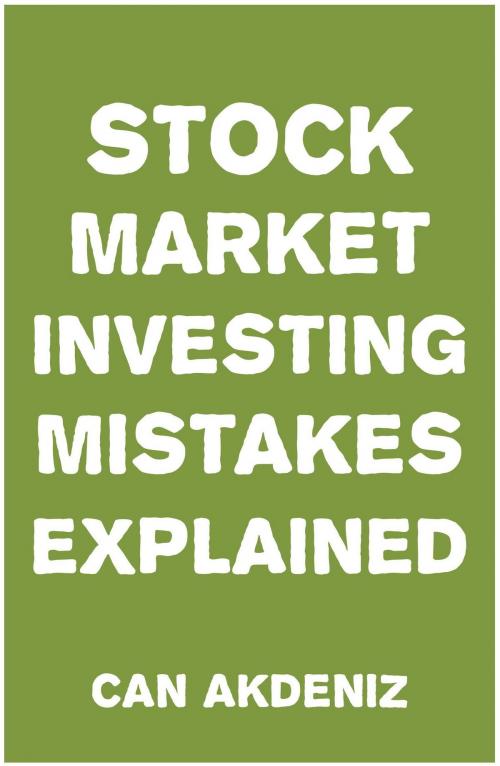| Author: | Can Akdeniz | ISBN: | 9781310464225 |
| Publisher: | IntroBooks | Publication: | January 13, 2016 |
| Imprint: | Smashwords Edition | Language: | English |
| Author: | Can Akdeniz |
| ISBN: | 9781310464225 |
| Publisher: | IntroBooks |
| Publication: | January 13, 2016 |
| Imprint: | Smashwords Edition |
| Language: | English |
Just as with raising children or as in nurturing one’s career, “success” with personal investing allows plenty of room for subjectivity. After exploring the common opinion of prominent economic actors, established entrepreneurs and financial advisors, I have come to define a successful investor as someone who, with a moderate of time, devises an investment strategy to achieve financial and personal objectives and who gains access to competitive returns by undertaking a certain degree of financial risk. Upon a careful investigation of recent market trends, investing research and stock market perception, it becomes apparent that stock market-specific decision-making builds both on objective variables (unbiased reports, facts, financial figures, diagrams), and subjective factors, in other words, investors’ reactions to quantifiable market indicators (apprehension, haste, stubbornness, fear, greed, impatience, etc.). Especially among the ranks of inexperienced stock market investors, this overlap renders market actors prone to a number of investing mistakes, some bigger than others. In other words, quality decision-making in stock trading is not limited to staying up to date with the facts; it is more about learning how to perceive and interpret the information you get in order to come up with conscious, well-thought-out action plans. Even the most knowledgeable and intelligent stock market players can succumb to simple mistakes if they base their decisions on pure instinct instead of reasoning. And, in fact, a large majority of mistakes are the consequence of subjective thinking, or, in other words, letting feelings take control when making decisions. Because of that, before we begin enumerating and discussing the most common mistakes and traps of stock market investing, we will first discuss the behavioral aspects of investing and probe into several important aspects of cognitive psychology. Once we have learned a little about behavioral biases and how we can avoid letting our feelings take control over the logical mind, we will move on to the most common subjective factors (mostly emotions and misperceptions) that are known to trigger error-prone thinking. We will analyze in this book each of these emotions in turn and come up with a way to take control over them when making financial decisions. Lastly, we will discuss the deadly mistakes in stock market investing in relation with the subjective factors that produce them and see how we can overcome each of them. Therefore, the last chapter of this article serves as a collection of common obstacles that may keep you from being successful and fully accomplishing your financial goals, which also includes useful tips and advice for overcoming those obstacles on your road to stock market investing success. Happy reading and good luck!
Just as with raising children or as in nurturing one’s career, “success” with personal investing allows plenty of room for subjectivity. After exploring the common opinion of prominent economic actors, established entrepreneurs and financial advisors, I have come to define a successful investor as someone who, with a moderate of time, devises an investment strategy to achieve financial and personal objectives and who gains access to competitive returns by undertaking a certain degree of financial risk. Upon a careful investigation of recent market trends, investing research and stock market perception, it becomes apparent that stock market-specific decision-making builds both on objective variables (unbiased reports, facts, financial figures, diagrams), and subjective factors, in other words, investors’ reactions to quantifiable market indicators (apprehension, haste, stubbornness, fear, greed, impatience, etc.). Especially among the ranks of inexperienced stock market investors, this overlap renders market actors prone to a number of investing mistakes, some bigger than others. In other words, quality decision-making in stock trading is not limited to staying up to date with the facts; it is more about learning how to perceive and interpret the information you get in order to come up with conscious, well-thought-out action plans. Even the most knowledgeable and intelligent stock market players can succumb to simple mistakes if they base their decisions on pure instinct instead of reasoning. And, in fact, a large majority of mistakes are the consequence of subjective thinking, or, in other words, letting feelings take control when making decisions. Because of that, before we begin enumerating and discussing the most common mistakes and traps of stock market investing, we will first discuss the behavioral aspects of investing and probe into several important aspects of cognitive psychology. Once we have learned a little about behavioral biases and how we can avoid letting our feelings take control over the logical mind, we will move on to the most common subjective factors (mostly emotions and misperceptions) that are known to trigger error-prone thinking. We will analyze in this book each of these emotions in turn and come up with a way to take control over them when making financial decisions. Lastly, we will discuss the deadly mistakes in stock market investing in relation with the subjective factors that produce them and see how we can overcome each of them. Therefore, the last chapter of this article serves as a collection of common obstacles that may keep you from being successful and fully accomplishing your financial goals, which also includes useful tips and advice for overcoming those obstacles on your road to stock market investing success. Happy reading and good luck!















